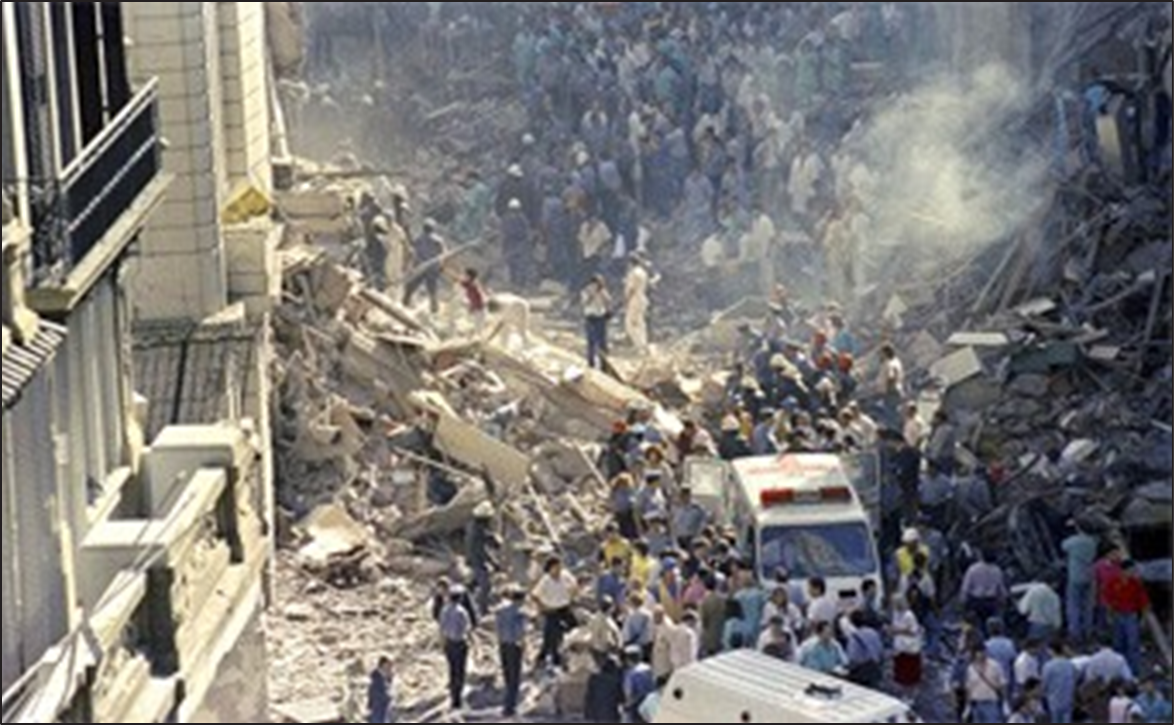May 10, 2024

The bombing of the Israeli embassy in 1992 killed 29 people. Just three days after the Argentine Supreme Court acted, the Islamic Republic sent hundreds of drones and missiles raining down on Israel because, Iran told the world, Israel had fired a missile into its consulate in Damascus, violating one of the most basic of international laws, recognizing the sanctity of diplomatic premises and banning any attack on them.
The regime in Tehran did not seem to see any irony in this. It simply ignored what the Argentine court said. In his presentation in the ruling, Judge Carlos Mahiques stated that Iran organized the bombing and that the Lebanese Hezbollah was the main perpetrator of the attack, which it alleged was carried out in part because Argentina had unilaterally rescinded three contracts to provide Iran with nuclear materials and technology.
This had long been speculated as the motivation for the attacks. But the court did not lay out any evidence for its conclusion. There were actually two bombings laid at the feet of Tehran and Hezbollah. In 1992, a bomb attack on the Israeli Embassy left 29 dead. Two years later, a truck loaded with explosives drove into the AMIA Jewish community center and detonated, leaving 85 dead and 300 injured.
The latter was the dead liest attack in Argentina’s history. “Hezbollah carried out an operation that responded to a political, ideological and revolutionary design under the mandate of a government, of a State,” said Mahiques, one of the three judges who issued the decision, in an interview with Radio Con Vos, referencing Iran.
The Shiite group “acted under the inspiration, organization, planning and financing of state and parastatal bodies subordinate to the ayatollahs’ government,” reads the ruling.
The court called on the Argentine state to lodge a formal complaint in international courts against the Islamic Republic of Iran. A former national intelligence chief, Hugo Anzorreguy, was sentenced to four-and-a-half years in jail for his role in obstructing the AMIA probe.
Anzorreguy was among some dozen defendants who faced a slew of corruption and obstruction of justice charges in the case, including the former judge who led the investigation into the attack, Juan Jose Galeano, who in 2019 was jailed for six years for concealment and violation of evidence.
It was the cases of alleged cover-ups that were before the nation’s highest court. In its 711- page ruling, the court examined the geopolitical context of both attacks and determined that the motivation for the attacks was, though not entirely, related to the foreign policy approach adopted by then-President Carlos Menem, whose parents immigrated to Argentina from Syria.
The AMIA welcomed the ruling but lamented more than three decades of “impunity” as a “shameful mark in Argentine history.” The three judges leading the court ruled April 11 that the AMIA attack was a crime against humanity, and put blame on thenIranian President Ali-Akbar Hashemi-Rafsanjani as well as other Iranian officials and Hezbollah members.
The attacks were revenge for “the government’s unilateral decision to cancel three contracts for the provision of nuclear material and technology agreed with Iran, as a consequence of a shift in foreign policy [when Menem was president] between the end of 1991 and mid-1992,” said the ruling.
For that reason, Iran decided to plan and carry out the attacks “as an extreme form of pressure on our country to reverse by force of coercion its decision to cancel those agreements,” they wrote.
Mahiques, along with fellow Judges Angela Ledesma and Diego Barroetavena, determined that both attacks were planned from Iran and carried out by Hezbollah. The court reduced the prison sentence against ex-judge Galeano from six to four years for his presumed illegal payment to car dealer Carlos TelleldÌn to falsely implicate Buenos Aires provincial policemen in the attack on AMIA.
The prison sentences of former prosecutors Eamon Mullen and Jose Barbaccia stayed at two years, while Telleldin was acquitted because his direct or indirect participation in the attack could not be proved.
Also acquitted was the latter’s ex-wife, Ana MarÌa Boragni, who during a recent hearing told the court that when the illegal payment of $400,000 to her ex-husband was agreed, then-Interior Minister Carlos Corach was present. Former Jewish community association president Ruben Beraja was also acquitted.
Ex-judge Galeano was also cleared of covering up the socalled “Syrian connection,” an acquittal further extending to the late President Menem. They had all been convicted in the cover-up. No one has yet been convicted for the actual bombings. But the ruling also declared both bombings to be crimes against humanity, thus placing them beyond the statute of limitations despite the passage of time and the lack of judicial results to date.
